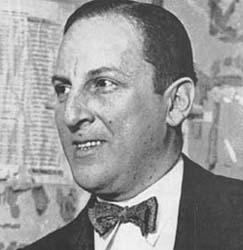Punting Profiles: Arnold Rothstein
The Big Bankroll they called him. The Brain. Mr Big. Even the mere mention of his initials, A.R, elicited a known look from all within hearing distance. In his hey day, Arnold Rothstein was the biggest gambler in America, standing gracefully on both sides of the ledger. He owned a town and controlled an empire. He was so big that despite denials it is universally accepted that he fixed the most hallowed of American affairs, the World Series.
Born the son of a proud Jewish businessman, Rothstein disappointed his father by showing little aptitude for school, caring only for math and dropping out at the age of sixteen. He was marked as the disappointment but he came to mix in the echelons of American society through the power he wielded throughout all classes of New York life. By the 1910’s, he was one of the biggest gamblers in America. By the twenties, he was one of the biggest players in America, now no longer just a gambler but the first big head of organized crime in the United States.
When Rothstein left school and home, it was to pursue life as a gambler. He had started betting as a twelve year old and it wasn’t long before his roll started building. He held odd jobs once he left the security of home but it was in the pool halls where his love resided and where his reputation was building. Even at the boyish age of sixteen, Rothstein had built a reputation as an astute gambler and fine pool player. At the same time, Rothstein moved into money lending, a business that he would make him The Big Bankroll and a money maker that Rothstein would be heavily involved in until his final breath.
Rothstein had a gift for numbers. He could crunch them and fiddle with them and use them to his advantage. He knew this was his strength in his early days and when hitting the floating craps games along Broadway, he was a major success against the desperates and degenerates who frequented the dens. His name was even being spoken of at Tammany Hall- the great Democratic Party machine that ran New York- in glowing terms and he was soon in close association with the man who ran Tammany Hall, “Big” Tim Sullivan.
AR was a man who was willing to gamble on most things. He played the horses and loved shooting dice. Baseball was a favourite and he made plenty of scratch betting on elections and big fights. And whenever there was a game of poker with high enough stakes, Rothstein was involved. He loved the punt so much that when on his honeymoon, at Saratoga when the horses were running, Rothstein hocked the expensive jewelry he had purchased his wife to fund his horseplay. He won $12,000, retrieved the diamonds and pearls and told his wife he would retire from gambling when he made a lot of money. He never did.
With his Saratoga winnings and a loan from his father-in-law, Rothstein opened his first gambling house, doing it with the blessing and protection of Tammany Hall. AR had reached the conclusion that he would get more of the best of it on the other side of the table. He was not wrong. Rothstein reaped in a small fortune and as he did, his status and influence grew. In one night, an American Tobacco Company man dropped $250,000 at Rothstein’s. On another, a mark Rothstein had recruited called Charles Gates dropped $40,000 playing roulette. The money was big in the gambling house game and Rothstein, always on the forefront of a business opportunity, expanded. He opened gambling dens on Long Island in 1913 and Saratoga Springs in 1919 as well as bankrolling plenty of others. He always believed that what attracted gamblers to a joint were women, booze and money. He was right, at least back then.
Rothstein was also the first lay-off bookie in the United States, taking bets to offset the big holds of other bookies. He was the first point of call for any decent-sized book and he made plenty out of it as he organized bookmaking in the US for the first time. This was one of his lasting legacies to American sport.
While Rothstein certainly migrated to the plush side of the ledger with his foray into gambling houses, he still bet large from the punters side. One of his most famous bets came in 1910 when he foiled a hustle and walked out with over ten large. Knowing AR was extremely confident in his pool playing abilities, a crew of Broadway hustlers bought in the most reputed pool shark in Philadelphia, Jack Conway, to try and clean out Rothstein. When the deal went down, it lasted for over 36 hours with Rothstein playing until nobody else could pay.
Rothstein was also extremely well known on the racetrack, where he pulled off a number of betting coups that are still talked of today. In 1917, AR bet $240,000 on a horse by the name of Hourless in a match-race with Kentucky Derby winner Omar Khayyam. Not being able to get the bet on anywhere, Rothstein was surprised to receive a number of calls informing him his bet would now be accepted. Rothstein, realizing that the fix was in, called the trainer of Hourless and informed him of the goings-on, suggesting a change of jockey was in order with bookies expecting Hourless to get stitched-up. When the late rider change was announced, bookies went pale and when Hourless won easily, pocketing $300,000 for Rothstein, many bookies were left feeling sick.
The size of that bet by Rothstein was topped only twice on the track, both in the summer of 1921, when AR made two spectacularly large wagers. The first was on a horse he owned, Sidereal. Sidereal was stabled at Aqueduct and not expected to run at Belmont the day Rothstein made the bet. AR, knowing the horse was on the way to the track, had over forty commission agents that day, getting on to win $850,000. Less than two months later, he backed another of his steeds, Sporting Blood, to win the Travers Stakes. He took the bookies for over $500,000. Many cried foul at the time but Rothstein was never found guilty of race fixing and those close to him insist he always ran a straight-up horse operation and that he made his money on good information, not deceit. AR had the money to pay, they insist, and this is how he won.
While many give him the benefit of the doubt when it came to the race-fixing accusations, he was given no such grace when it came to claims that he had fixed the 1919 World Series. Chicago White Sox players, irritated at the tight nature of owner Charles Comiskey, tanked the Series to the Cincinnati Reds. The fix quickly became known as the ‘Black Sox’ scandal and the story went that Rothstein had organized the job. Though eight baseball players were barred and people were jailed, Rothstein was never found guilty of any related charge and no bet was ever found in Rothstein’s name. He claimed his name was used by a bunch of cheap gamblers and he had nothing to do with the skullduggery but there is plenty of evidence to suggest otherwise.
It wasn’t all good times for Rothstein though. He had his share of losses and rough times, as all gamblers do. He lost $270,000 on a single race in 1921. He was robbed after a number of crap games and poker nights. In 1928, he lost over $300,000 in a poker game that included fellow legendary gambler Titanic Thompson.
It was that lose that bought about the demise of Rothstein. Believing the game was a fix, Rothstein refused to pay. Though he had more than enough money to pay- through ventures such as his virtual monopoly on drug importation, illegal liquor, bookmaking and numerous legitimate interests- he refused to do so. He was shot a week later and though surviving surgery, died within the week. As he lay in his hospital bed, he refused to name his attacker and nobody was ever found guilty of the murder, though it is generally believed to have come as a result of Rothstein’s welshing on the poker game.
Had he survived, he would have collected $570,000 from election bets. But, as he died on Election Day, all bets were deemed to be null and void. Despite having publicly announced his retirement from gambling in October of 1921, AR was a gambler until the death. Once a gambler, always a gambler was the way he rolled and he was never one to pass up an opportunity. “If a man is dumb, someone is going to get the best of him, so why not you? If you don't, you're as dumb as he is” Rothstein used to say. And he was right. You need to take the best of it and the only way you get that is if someone else has the worst of it. That is the simple logic Rothstein used to carve out a profitable career and a revered legacy in gambling lore.
This article was first published on Punting Ace in 2008


The card game was fixed, and Titanic was in on the fix. But he was a welsher. Notoriously bad at paying up when he lost. Which is just bad business.
I like the line he gave when someone (I think his father) compared him unfavourably to his brother (who became a Rabbi) "My brother can be Jewish, I'm going to be American".